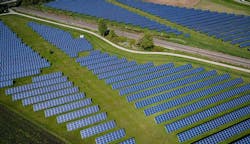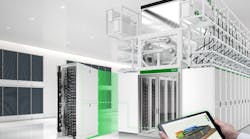The Green Data Landlord: Digital Realty Procures Solar Power for Facebook
Huge hyperscale Internet companies aren’t just outsourcing their data center requirements. Now they’re having their data center landlords procure their renewable electricity, too.
In a deal that reflects the evolving relationship between data center developers and their hyperscale tenants, Digital Realty has procured 80 megawatts of solar power on behalf of Facebook. The renewable energy will offset Facebook’s use of energy to power its servers and storage equipment in Digital Realty data centers in Northern Virginia.
The companies say the agreement is the first “back-to-back” utility-scale transaction in which a data center landlord uses a virtual power purchase agreement for a renewable energy supply dedicated to a customer.
It also illustrates the growing importance of renewable energy in the relationship between hyperscale customers and their landlords. The deal will boost Facebook’s sustainability initiatives by “greening” a part of its leased colocation footprint that has been most reliant on coal and nuclear power. It also provides a clear path for Facebook to renew about 40 megawatts of leases in Digital Realty data centers in Ashburn, Virginia.
Will renewable power become part of the “turnkey” offering for hyperscale operators looking to lease data center space? Industry watchers have long wondered whether data center developers would get into the utility business, and what shape that might take. Digital Realty’s announcement today is an interesting development in this relationship. Let’s start by looking at the structure of the deal and the trends surrounding it.
‘Tailored Agreements’ for Key Customers
Digital Realty has contracted with SunEnergy1, which will own and operate the solar project, which will be located within Virginia Electric and Power Company territory in North Carolina. The renewable energy certificates and environmental claims for the 80 megawatts of power will be delivered to Facebook.
Digital Realty worked with Facebook to meet with the company’s quality standards for new renewable energy projects, which must be located within the same power grid as the data center load.
“Our scale and position as a leader in data center sustainability enabled us to execute this first of its kind agreement in support of Facebook’s sustainability goals,” said William Stein, Chief Executive Officer of Digital Realty. “Many of our customers have specific renewable energy requirements, and we work diligently to provide cost-competitive solutions tailored to their needs. We were able to take Facebook’s quality standards and timeline into consideration and deliver this solution in a competitive marketplace and at a competitive price. We are very pleased to be part of the solution enabling Facebook to achieve its renewable energy goals.”
“Facebook is committed to supporting all of its operations with 100 percent renewable energy and to improving overall access to renewable markets,” said Bobby Hollis, Director of Global Energy and Site Selection at Facebook. “We are thrilled Digital Realty has entered into this agreement.”
The Greening of the Cloud
Cloud computing has emerged as a surprising force for the commercialization of renewable energy at Internet scale, with Google, Amazon, Microsoft and Apple sourcing renewable energy to power their cloud data centers. This usually happens through utility-scale power purchase agreements (PPAs), with hyperscale operators buying the output of generators of solar and wind power, bringing new renewable energy onto the grids supporting their data centers.
As an example, in 2018 Facebook announced power purchase agreements for 1,850 megawatts of renewable energy in 2018, helping corporate buyers set a new single-year record for green power procurement, according to the Rocky Mountain Institute.
The multi-tenant data center market has been slower to adopt green power at scale. Customers are focused on reliability and cost, and have historically been resistant to making any tradeoffs to source renewable energy. Because colocation facilities serve many customers in the same data hall, they can see wide variability in power loads and server utilization.
That has changed over the last several years as providers like Digital Realty and Equinix and Switch have begun purchasing renewable power to offset their customer energy use. Digital Realty has contracted for approximately 745,000 megawatt-hours of renewable generation annually through long-term power purchase agreements, avoiding approximately 525,000 metric tons of carbon dioxide per year.
Making Colocation Leases Greener
Facebook used 2.46 million megawatt hours (mWh) in 2017, with 51 percent of that total coming from renewable sources, 18 percent from coal, 14 percent sourced from nuclear generation and 13 percent from natural gas. Facebook’s East Coast colocation footprint was responsible for 122,000 metric tons of CO2E (see data on the Facebook Sustainability site), representing its third-largest source of greenhouse emissions behind company-built data center campuses in Forest City, N.C. (137,000 metric tons) and Prineville, Oregon (293,000 metric tons).
A solar power array outside the Facebook data center in Prineville, Oregon. (Photo: Rich Miller)
Facebook has always sought to limit the environmental impact of its data centers, creating some of the world’s most efficient facilities, with an average PUE (Power Usage Effectiveness) rating of 1.10. Despite that, the Prineville site’s use of coal-sourced energy prompted the environmental group Greenpeace to launch a public relations campaign calling on Facebook to “Unfriend Dirty Coal” by sourcing green energy, instead of relaying up the power mix from local utility.
Facebook has since made a commitment to source renewable energy for its data centers. Cloud campuses in Iowa, Sweden and Forth Worth use nearly 1 million mWh annually with virtually no greenhouse gas emissions between them.
The deal with Digital Realty will provide green energy sourcing to offset Facebook’s footprint in Ashburn, where it leases space in four data centers developed by DuPont Fabros Technology, which Digital Realty acquired in 2017. Some of those leases are coming up for renewal soon, and securities analysts have been focused on whether these deals would be renewed, and on what terms. Given Facebook’s growing focus on sustainability, shifting the footprint of those leases to solar makes that an easier decision. The social network is also a major prospect for Digital Realty’s new campus in Ashburn, as well as future campuses.
Facebook’s Hollis said he hoped the agreement “will serve as a model for other colocation customers seeking to support their operations with high-quality, renewable energy projects.”
A Trend in the Making?
So is this a one-off deal for Digital Realty, or will other providers seek to use renewable procurement as a way to win deals with green-focused tenants? Digital Realty appears to see this as an area of opportunity. It recently used its scale to construct multi-campus deals that improved their pricing on power, and position them to join the hyperscalers in constructing creative ways to acquire renewable energy at scale.
“While we have one of the largest portfolios of green building certifications in the data center industry and a rapidly progressing sustainability strategy, we recognize this is a continuous and collective effort,” said Aaron Binkley, Digital Realty Senior Director of Sustainability, in a recent column at Data Center Frontier. “We need to lower our carbon footprint. Our industry must tackle solutions with the best and brightest of minds and technologies.”
If green power procurement will matter in more hyperscale deals, it will matter first in Northern Virginia. It is the world’s most active market for cloud computing, and the most competitive, with a growing number of new entrants. Dominion Energy has a strong track record supporting data center growth, but its generation mix is currently low on renewable energy. Direct PPAs to support hyperscale data center expansion have provided financial support for new solar and wind farms, but it will be interesting to see if new players in Ashburn see green power procurement as an area where they can gain traction. Digital’s deal with Facebook serves notice that it has this capability, and can wield it in key tenant relationships.
About the Author



